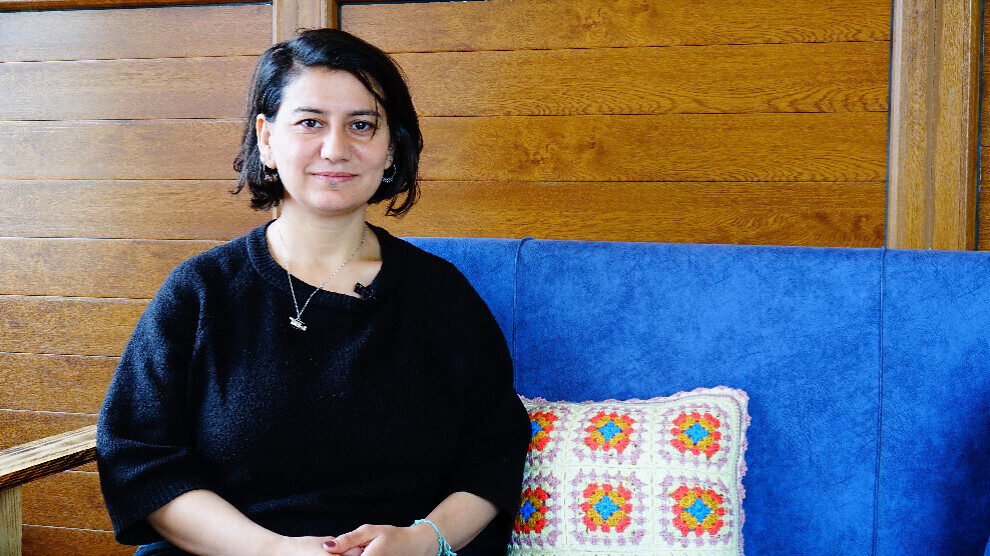Safînaz Evdikê: The TV series called “The Night of the Fall" does not show the true face of ISIS
Safînaz Evdikê, member of the Kezî Collective for Women Filmmakers, thinks the TV series called “Laylat al-Suqut (English: The Night of the Fall)”, a series depicting the fall of Mosul at the hands of ISIS, does not show the true face of ISIS.

SORGUL ŞÊXO
Qamishlo- The Yazidi community has been subjected to genocidal attacks many times throughout history. In the attack of ISIS on the Yazidi community on August 3, 2014, 7,000 Yazidi women and children were abducted, and thousands of Yazidis were brutally killed. While ISIS were openly committing a genocide against Yazidis, all countries played ostrich and Yazidi women were sold in slave markets in the 21st century.
Although eight years have passed, the wound of Yazidis is still fresh as if the genocide was committed against them only yesterday. Iraq and many countries have not recognized the crimes committed against Yazidis by ISIS as a genocide yet. The Yazidis see the Sinjar agreement signed by the Turkish state, the Iraqi government and the Kurdistan Democratic Party (KDP) on October 9, 2020 as a continuation of the genocide against them. In Iraq, a TV series named “Laylat al-Suqut (English: The Night of the Fall)” has been broadcasted. The episodes of the series, depicting the fall of Mosul at the hands of ISIS, spark anger among Yazidis. The TV series cast and crew, including actors, actresses, directors and writers, are Iraqi and Syrian people. The series also tells of the attack of ISIS on Shengal. NuJINHA spoke to Safînaz Evdikê, member of the Kezî Collective for Women Filmmakers and the post production manager of the film named “Letters from Sinjar", about the TV series.
‘The series does not reflect Yazidis’
“Before talking about the attacks, the Yazidi society, identity and culture in Shengal must be talked about,” Safînaz Evdikê said, “The Laylat al-Suqut series is a series in Arabic. The Yazidi language is not used in the series. Before shooting this series, no research about the Yazidi culture was carried out. The Yazidi community has a unique and ancient culture; however, it is not reflected in the series. The customs, places and decorations used in the series do not reflect Yazidis. In order to shoot a series telling events from real life, you must first carry out research for years. This series does not reflect Yazidis at all.”
‘What this TV series tells is far from the truth’
Noting that ISIS attacked Yazidi to commit a genocide, Safînaz Evdikê said, “A genocide was committed against the Yazidi community; however, there is sufficient document telling what happened that time. Why did ISIS attack the region of the Yazidi community? Because ISIS wanted to attack the language, culture and belief of the Yazidis. This series does not reflect the realities experienced in Shengal in 2014. What this TV series tells is far from the truth.”
‘Peshmerga did not protect the people of Shengal’
“The Peshmerga forces of the KDP left the Yazidis alone in Shengal,” Safînaz Evdikê said. “However, the series shows the Peshmerga forces as the protectors of Shengal. This is not true; the Peshmerga forces left the people of Shengal unprotected and fled. There are footages that documented how the Peshmerga forces fled. If the Peshmerga forces had not fled, thousands of women would not have been abducted; thousands of people would not have been killed. A corridor was opened for Yazidis between Shengal and Rojava. This humanitarian corridor was opened thanks to the efforts of the YJA Star/HPG, YPJ/YPG. They saved Yazidi women, children and old people from being killed. This series does not tell this.”
‘The series does not tell the resistance of women’
Safînaz Evdikê thinks the KDP and Iraqi government aim to hide their true face through the series. “More than 10 films have been shot about Yazidis in the Middle East and other parts of the world. The director of the Laylat al-Suqut series is an Arab from Syria. We know very well that the director cannot say who saved Shengal. They brought an Arab director from Damascus and shot an Arabic series, which is far from the truth. In the series, the role and the resistance of Yazidi women are not told. For example, there is a Yazidi woman who is a teacher and a doctor. Instead of highlighting this role, they did the opposite. The series tells that an ISIS leader falls in love with a Yazidi woman, but in reality there is no such thing. It does not tell the Yazidi women, who were abducted and sold in slave markets. There are still many missing Yazidi women; however, it does not mention them. There are now many Yazidi women living in camps; however, it does not mention this. The series does tell the resistance of Yazidi women.”
The Kezî Collective for Women Filmmakers continue to shoot films telling what the Yazidi people experienced in the genocide committed against them by ISIS. “Letters from Sinjar, a film directed by Dersîm Zêrevan, tells the pain, hope, difficulties and struggles of Yazidi women in Shengal (Sinjar). The film consists of six parts and each part is about a letter.
